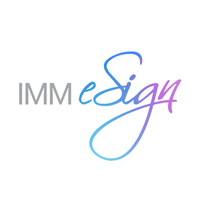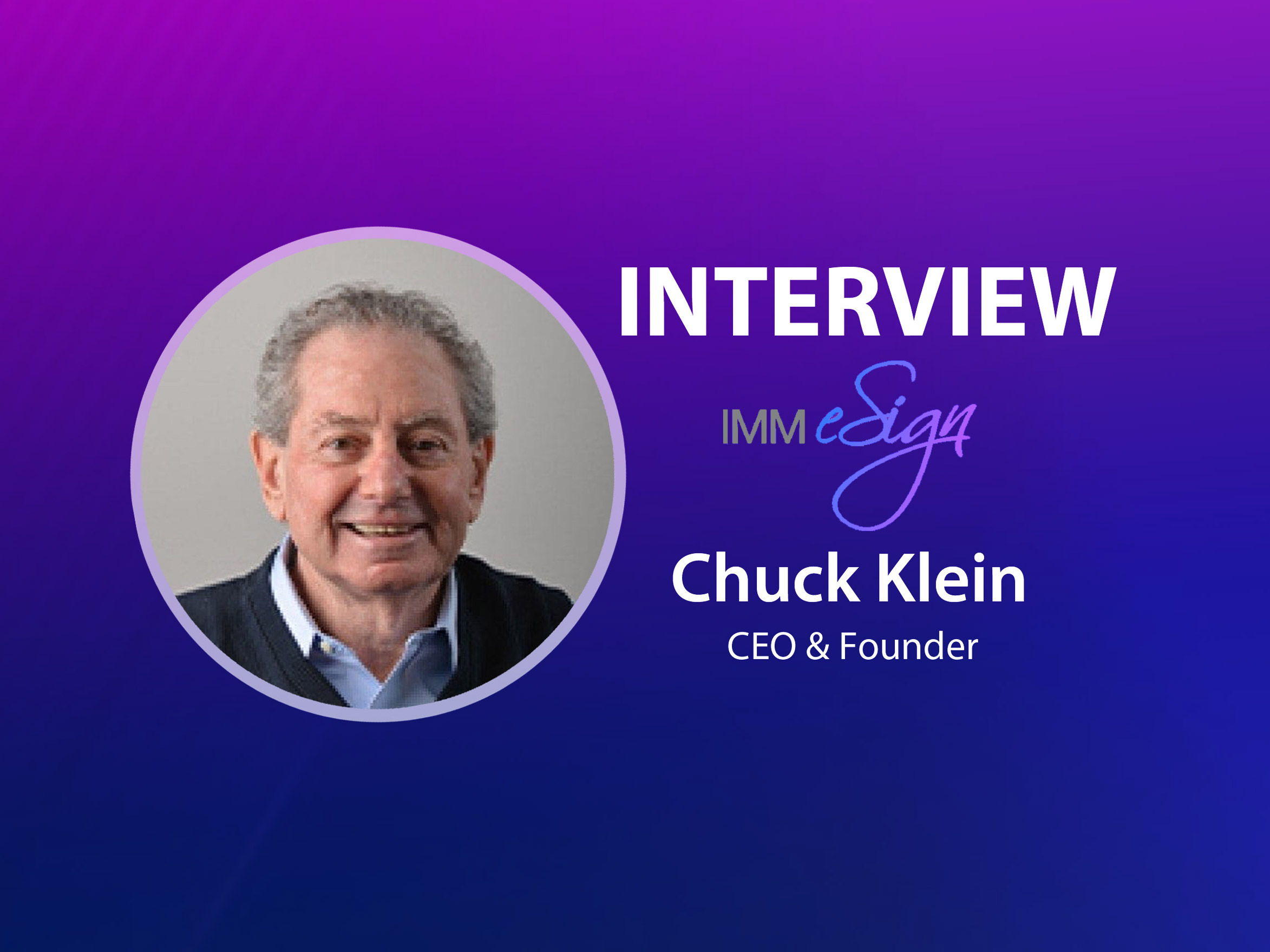Being agile is one way to try and circumvent the business challenges the Covid-19 pandemic has caused, better business process automation and online facilities that help customers support their end to end business needs are what will support the new normal more effectively. Chuck Klein, Chief Executive Officer & Founder at IMM joins us in this interview to talk about the renewed need for safer online documentation and e-signature facilities during these Covid-19 days.
_____
Can you tell us a little about yourself Chuck? How did the idea behind IMM come about, as a tech entrepreneur in this space, what has your journey been like?
In the early days, I actually began my career as an accountant doing work for a couple of CPA firms. From there, I moved to a position as a controller, and then on to serve as CFO in a public company. It was at this point that I had an idea that I believe many tech entrepreneurs have: If I’m doing this for other folks, maybe I could be doing it for myself.
What this idea led me to first was founding my first company, a service bureau, ASB Systems. There, we were custom designing and ordering a lot of forms (from another vendor) for our clients, and that was not an overnight process like it is now; it took time. I thought – why can’t we create our own forms? That would be easier and less expensive, not to mention – much faster turnaround. So, I hired a topnotch forms person who truly knew the industry as well as the associated processes and started a forms company within ASB Systems, Comply.
About this same time laser forms entered the market – which sounded so interesting to me – and I decided if we were going to continue with the forms business, it was going to be electronic forms. I parted ways with ASB Systems and focused all my energy on Comply, which became Integrated Media Management (IMM). And as they say, the rest is history. That was in early 1996 and the company was located in Tallahassee, Florida; we are now headquartered in Rahway, N.J.
As I think back, that’s probably how I started everything I ever did; just by seeing something and asking, “where is this going to lead?”, and then following that stream of thought through to the end.
Read More: Why Does Every Bank Need a Balanced Remote On-boarding Process?
Tell us a little about the latest innovations and developments at IMM, or new innovations planned for the year in light of the effects of the Covid-19 pandemic on the finance/fintech sector and the renewed need for secure documentation and e-sign facilities?
I think we have been affected by Covid-19 in much the same way as other companies. Every employee and all of our operations have moved into a remote environment. We have implemented digital offerings internally to facilitate this shift that have worked so well, we are planning on continuing their use once the pandemic is over. Our employees have done a remarkable job with the transition and ensuring our customers receive the same, if not better, service. How we physically get to our customers may have changed, but not much else in the way of service for them.
Almost overnight, financial institutions have had to pivot in order to continue providing critical banking services to a now digital customer base. One of the things we’ve developed for our customers has been the Quick Start eSign Program, a solution designed specifically for banks and credit unions that cannot currently complete and sign key documents remotely. Leveraging this new program, financial institutions can begin remotely processing documents within approximately 48 hours and have the ability to migrate to IMM’s full enterprise eSignature platform at any time during the one-year program. Quick Start eSign lets financial institutions complete consumer’s financial requests without direct personal contact. New accounts can be opened; new loans can be completed; account service requests can be processed; and loan modifications or extensions can be facilitated.
Given the ongoing pandemic, what thoughts do you have for the way tools and tech that enable better documentation processes and contract lifecycle management features will need to evolve? With more teams and functions working remotely, there will be a growing need for more of these tools/features…your thoughts?
An important piece of the puzzle for us has been learning from our customers what they currently need, and what they are looking to do going forward. Their business objectives, and the challenges they need solved help guide our strategy. We could potentially be working remotely for quite some time, so we are developing a virtual townhall program that enables us to get customers and IMM representatives together to discuss new enhancements, product updates and future roadmaps. We want to stay connected to our customers, hear their voice, and determine how we can best help them.
How will the effects of the pandemic impact new innovations in banking or affect the overall banking segment as a whole?
We’ve already seen the pandemic push people, organizations and financial institutions to where they may have been uncomfortable before. Now, banks and credit unions are becoming more willing to take the leap into technology that previously might have made them hesitate. And not just from a technology perspective, but also taking into consideration government restrictions. For instance, the electronic notary has not been something available in most places. But now, communities, counties and states are more understanding of the need for an electronic notary because people are still buying and selling houses. The need hasn’t disappeared, but again, how you get there has changed.
What are your thoughts on how the digital banking space will now innovate and develop as a result of a growing need to move every transaction to digital (not only because of the pandemic, but in general, there has been a bigger need for better digital banking facilities) and how does this impact the overall customer documentation process (while opening an account, submitting proofs and documents).
It seems like instead of automating one task, people will be more willing to and more interested in automating the entire process. Workflows are very important in this process to ensure documents get sent to the correct person in the chain for their review/approval. It needs to come full circle. Digital transformation for me means business process automation from start to finish. That is what the modern consumer needs and what the next generation of consumers will absolutely expect. They need to be met when and where they would like to conduct business without gaps or interruptions. It is no longer a nice to have, but has become a must have. As we look at the future of banking – it is not today – it is tomorrow and what needs to be done to remain competitive and serve the customers of tomorrow to the fullest.
What are some of your thoughts on the impact of emerging technologies on the growth and development of future fintech platforms or apps and platforms for banks/other financial institutions?
To reiterate the above point, piecemeal automation needs to evolve. Processes must be automated from beginning to end to be truly functional. This doesn’t mean needing to lose employees to do it either, it is simply putting the people in the place where they do the thinking, and then the technology does the work.
Tag (mention/write about) the one person in the tech / fintech industry whose answers to these questions you would love to read!
Bill Gates -> When IBM started with some of the original massive computers – the kind of computers that took up an entire room – where there was usually a viewing window behind the receptionist desk looking onto the behemoth machines – the only guy who knew how important the software was, and not the hardware, was Bill Gates.
If there was any advice you could give your younger self, what would it be?
Some of the best advice I ever received was from my economics professor in college toward the end of a semester. I asked him simply how he got his start. At the time, he was on the board for the New York Times and was a well-known economist. He told me he started in the mail room, but no matter what job he had he worked hard and did the best he could. Even if that meant sweeping the floor. Because doing your best is a habit. Once you get into that habit, you do the best you can no matter what, whether it was the least important thing or the most important thing.
The second most impactful piece of advice is this: think of your future as a stream of water, a river. You have to follow that river on its journey. They only thing you have to be aware of while following that river is you have to recognize where the opportunity exists and follow it. Life is never a straight line, but by keeping aware of what is offered to you, and oftentimes its offered in a not so obvious way, but by remaining aware and faithful to what could be great opportunities, you can end up where you want to be and where you’re the happiest.

IMM is the leading source of eSignature and eTransaction management solutions exclusively for Banks and Credit Unions. With a 23 year history of successfully providing eSignature solutions to over 1000 financial institutions, we can help you enhance the consumer experience, streamline process efficiencies, and reduce operating costs. The digital dream is now a reality with IMMeSign.
